Although it's been over 100 years since Germany signed the armistice that brought World War I to a close, in many ways “the war to end all wars” has never really ceased. From the outbreak of a Second World War just 20 years later to the Balkan conflicts of the 1990s and the current perilous state of the Middle East, the smoldering ashes of WWI have ignited time and time again.
These WWI books—covering the hostilities from the home front, the trenches, and the hospitals where soldiers were treated for a new injury known as “shell shock”—are essential to understanding how a century-old feud shaped the world we live in today. Though often overlooked thanks to its proximity to World War II, the first World War in many ways set the global stage that would reignite an international conflict in the 1930s. These books investigate how a seemingly minor political incident subsumed all of Europe, then the world, into a long-raging war that would cause some 16 million deaths of soldiers and citizens alike.
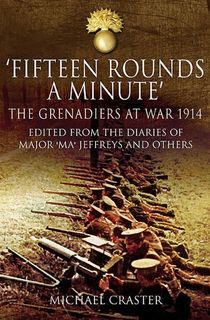
'Fifteen Rounds a Minute'
Originally published in 1976, Fifteen Rounds a Minute tells the story of the first five months of World War I as experienced by the Grenadier Guards of the British Army, when their mission was to stop the German Army's inexorable march toward Paris.
Read about the retreat from Mons, the Battles of the Marne and the Aisne and finally, the devastating First Battle of Ypres, and more in this illuminating and humanizing account of the war's early days, considered a staple of military writing.
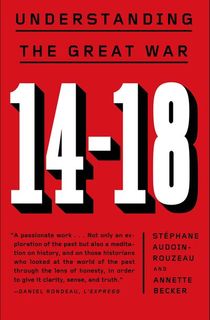
14–18
In this astute analysis of the Great War from start to finish, Stéphane Audoin-Rouzeau and Annette Becker position World War I as “the matrix from which all subsequent disasters of the twentieth century were formed.”
While many historical accounts of the war focus on its mechanisms and sequence of events, Audoin-Rouzeau and Becker turn their attention to three under-explored aspects of the conflict revolving around its unprecedented brutality: First, what inspired such brutality? Second, how did fervent racist and nationalistic impulses fuel this brutality? And finally, how did the tens of millions of people whose lives were shattered by the war cope with its brutality in the aftermath?
With its stunning attention to both historical detail and analysis, 14–18: Understanding the Great War has cemented itself as a classic in the study of modern warfare.
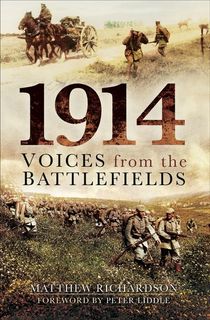
1914
Learn about the history of the First World War directly from the people who experienced it in this eye-opening collection of British soldiers' firsthand accounts. The brutal war of attrition which forever changed the nature of how war was fought left devastating and widespread physical casualties, but perhaps more striking is the mental toll it took on the men and boys who were, quite literally, in the trenches.
In addition to vivid narrative, this moving book includes full color plates containing over 100 illustrations.
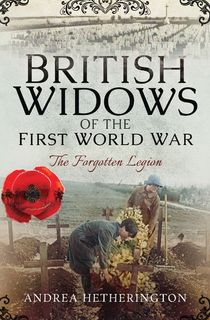
British Widows of the First World War
Most accounts of the “war to end all wars” focus on the men who lost their lives on the battlefield. But what about the wives they left behind? British Widows of the First World War is the first major account of how these women coped with the loss of their husbands and rebuilt their lives.
The book considers both their grief over having lost a life partner and the practical hardships they faced in the aftermath, such as supporting themselves financially and securing a widow's pension. It is as informative as it is moving, a story of both immense hardship and perseverence.
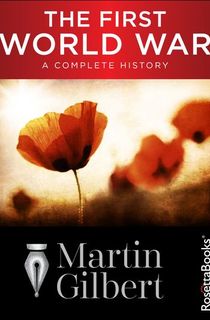
The First World War
World War One was 'the war to end all wars,' and no book encapsulates that better than Gilbert's sprawling epic. This was the war that brought us new weapons of death; transitioning human battle from 19th century tactics including cavalry and riflemen, to those of the 20th century—namely tank and germ warfare.
World War One was also a war of stagnation. The two sides fought bloody, horrific battles for months, sometimes conquering only a few meters of mud. The submarines, tanks, rapid-fire machine guns and artillery left millions dead or injured on the battlefield, and epitomized WWI as the turning point of modern military conflict.
No examination of The Great War would be complete without Gilbert's unflinching look at the war that shaped our modern era.
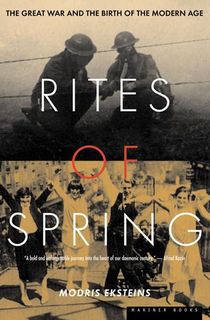
Rites of Spring
Beginning with the unrest that accompanied the premiere of Stravinsky’s The Rite of Spring in 1913, historian Modris Eksteins examines the origins, the reality, the impact, and the aftermath of the First World War.
Seeing the Great War as the beginning of modernism, the book explores much more than just what happened on the battlefield or in the halls of government, and explores the war’s impact on common people and on the art and culture of the world at large.
While Rites of Spring concerns itself primarily with World War I, it also explores how that war shaped World War II, and ends with the death of Hitler in 1945. In-between, Eksteins presents a compelling case for World War I as the crux of modernism itself and argues that it redefined not only the lives of those who lived it, but how we look at history, at culture, and at ourselves.
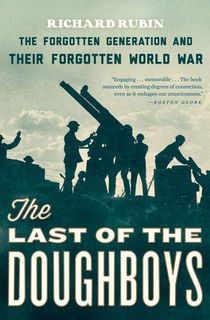
The Last of the Doughboys
What better way to immerse yourself in the trials and tribulations wrought by the treacherous battlefields of World War One than to do so through the eyes of those who served?
Rubin's account of The Great War, as seen through the eyes of WWI veterans, is unparalleled. Having interviewed American soldiers a full 85 years after the armistice that ended hostilities, Rubin takes us into the personal lives of those who served in some of the most famous and nightmarish battles of the war.
Their accounts are surprisingly humble, yet they still give pause over the magnitude of their service, and their contribution to the world by helping end the most brutal military stalemate of all time. Rubin's book is a rare treat, and one that every WWI history buff should include on their reading list.
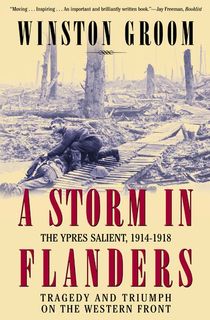
A Storm in Flanders
The Pulitzer Prize-winning author of Forrest Gump brings us an examination of one of the most treacherous battlegrounds in all of military history. The Ypres Salient in Belgian Flanders has come to epitomize WW1, featuring horror, heroism, and terrifying new tactics and technologies, including poison gas attacks, minefields, air strikes, and the unspeakable misery of trench warfare.
Groom mines the journals of the soldiers at the front for the memories and true-life accounts of what really took place at his landmark battle. Ultimately, the battle at Ypres was as senseless as World War One itself, which makes this historical account all the more haunting.
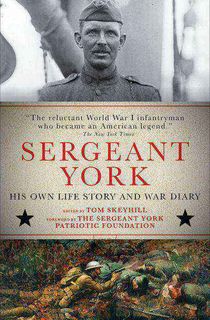
Sergeant York
Perhaps better known for its film adaptation directed by Howard Hawks—which won two Academy Awards in 1941—Sergeant York is the true story of a reluctant infantryman who became one of the most decorated soldiers in World War I. Alvin York’s own wartime diaries were adapted by a fellow soldier—Australian Tom Skeyhill, who was blinded during the conflict—to create this book detailingYork’s life and exploits both on the battlefield and off.
A compelling example of wartime memoir and patriotic propaganda—the film was shown as a recruiting tool and to help boost sales of war bonds during World War II—Sergeant York is also a compelling tale of how a conscientious objector was transformed into one of the greatest heroes of the Great War.
While the authenticity of York’s account of the battle of Argonne, during which he captured 132 German soldiers and was awarded the Congressional Medal of Honor, has been disputed by both historians and York’s fellow soldiers, one thing that can’t be downplayed is the impact of this book—and its cinematic counterpart—on America’s ideas about heroism, patriotism, and the First World War.
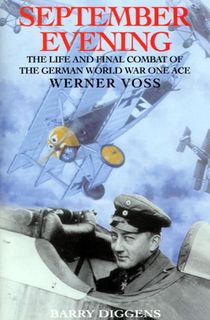
September Evening
Werner Voss was a legend in the German Air Force. As the youngest recipient of the Pour le Mérite, Germany's highest honor for soldiers during WWI, Voss is considered to be the greatest flying ace of his time—even more so than the famed 'Red Baron.'
Voss' audacity and daredevil flying techniques made him famous amongst German soldiers, and his death enshrined him as an icon. He was killed in one of the most famous dogfights of World War One: a battle with the 56 Squadron RFC, the most successful Allied scout squadron of the war.
Diggens' controversial account of Voss' life mines every aspect of the German soldier's life, and takes an unflinching look at a man who lived on the edge, and ultimately perished there as well.

The First World War
Twenty years after its original release, this gripping chronicle remains the best single-volume account of the war. Keegan, an acclaimed British military historian, brings a refreshingly clear-eyed perspective to some of the 20th century’s most confounding questions: Why couldn’t Europe’s greatest empires avoid such a tragic and unnecessary conflict? And why did so many millions of people have to die? By foregoing radio and telephone to communicate by letter, Keegan explains, world leaders effectively rendered themselves deaf and blind. The problem was grotesquely amplified on the battlefield, where weapons technology had advanced to the point that entire regiments could be wiped out in a matter of hours. No other history brings the war’s mind-boggling magnitude—70,000 British soldiers killed and 170,000 wounded in the Battle of Passchendaele alone —into sharper focus.

Paris 1919
WWI brought about the fall of the Russian, German, Austro-Hungarian, and Ottoman empires and displaced millions of people across Europe. Faced with the monumental task of reshaping the world, Allied leaders convened the Paris Peace Conference in January 1919. Over the next six months, delegates from 27 nations redrew international borders, hashed out the terms of Germany’s surrender, and laid the groundwork for the League of Nations. Above all, they aimed to prevent another world war. They failed, of course—Hitler invaded Poland just 20 years later—but this engrossing, comprehensive history debunks the harshest judgments of the Treaty of Versailles and provides essential context for understanding its myriad repercussions. MacMillan covers impressive ground, from the Balkans to Baku to Baghdad, without losing focus on the colorful personalities and twists of fate that make for a great story.
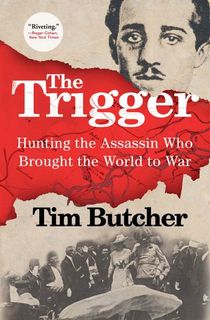
The Trigger
You may already know about World War One itself, but what about the man who started it? In this acclaimed biography, Tim Butcher explores the personality, character and life history of Gavrilo Princip—the man who made the fateful decision to assassinate Archduke Franz Ferdinand, heir to the Austro-Hungarian Empire, and kick off WWI.
Butcher retraces Princip's steps from the small village of his birth to Belgrade, where he joined a resistance movement and eventually became an assassin. Drawing on his own experiences covering the war in Bosnia in the 1990s, Butcher unravels the complexities and conflicts of this part of the world, and illustrates how the events of WWI have impacted the region today.

Goodbye to All That
This spellbinding autobiography is by turns poignant, angry, satirical, and lewd. It’s also, according to literary critic Paul Fussell, “the best memoir of the First World War.” A lieutenant in the Royal Welch Fusiliers (where he fought alongside his friend and fellow poet Siegfried Sassoon), Graves was severely wounded in the Battle of the Somme and reported killed in action. His family had to print a notice in the newspaper that he was still alive. As befitting a man returned from the dead, Graves breaks all conventions, mixing fact and fiction to get to the poetic truth of trench warfare. Sassoon, for one, objected to the inaccuracies, but Good-bye to All That touched a nerve with war-weary readers and made Graves famous. It has gone on to influence much of the 20th-century’s finest war literature, from Evelyn Waugh’s Sword of Honour trilogy to Joseph Heller’s Catch-22.
Related: This World War I Legionnaire Wrote "I Have a Rendezvous with Death"

Storm of Steel
An international bestseller when it was originally published in 1920, this fiercely lyrical memoir is the definitive account of the German experience during WWI. Jünger, a born warrior who ran away from home at the age of 18 to join the French Foreign Legion, fought with the German infantry in the Battle of the Somme, the Battle of Arras, and the Battle of Cambrai. He was wounded seven times during the war, most severely during the 1918 Spring Offensive, when he was shot through the chest and nearly died. He received the German Empire’s highest military honor, the Pour le Mérite, for his service. Taken from Jünger’s war diary, Storm of Steel has a visceral, in-the-moment quality that separates it from other WWI autobiographies. Some have criticized it as a glorification of war, while others, including Matterhorn author and Vietnam War veteran Karl Marlantes, think it’s one of the truest depictions of the combat experience ever written.
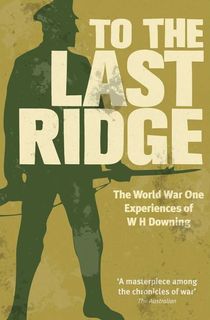
To the Last Ridge
While not as acclaimed as Storm of Steel, Downing's personal memoir of his time in trench warfare is no less jarring in its authenticity. Spare and vivid, Downing recounts with blinding accuracy some of the most horrific battles of the war. He takes readers into the rat-infested mud with graphic descriptions of the constant pounding of the guns, the deaths, and the futility, but also the humor and heroism of one of the most compelling periods in world history.

Wasteland
Bram Stoker Award nominated author W. Scott Poole, whose previous books include Monsters in America and a biography of Maila Nurmi, the actress better known as Vampira, traces the relationship between World War 1 and the advent of the horror film, arguing that the latter owes its conception to the former.
This thrilling and fascinating exploration of how the shadow of the Great War hangs heavy over horror cinema is not only a history of the war itself but also a history and a piece of cultural anthropology regarding horror on film and in literature.
Using some of the great figures of the early horror cinema as his jumping off point, Poole argues that horror as we know it today has roots that run directly to the battlefields and trenches of World War 1, and that we can still feel the echoes of the war when we sit down in a darkened theater—or just in front of our TV set—today.
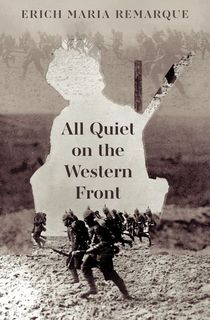
All Quiet on the Western Front
This iconic German novel was first serialized in 1928, 10 years after the armistice. The book version sold millions of copies and was quickly adapted into an Academy Award-winning film. By then, the Nazi Party was the second largest political party in Germany; Joseph Goebbels led violent protests at the film’s Berlin screenings. Three years later, he banned and publicly burned Remarque’s books in one of his first orders of business as Nazi Germany’s Minister of Propaganda. Why the intense hatred for the story of a young man who volunteers to fight in WWI? Because it is one of the most powerful anti-war novels in Western literature. In Remarque’s downbeat tale, one nameless battle is indistinguishable from the next and the lucky survivors are doomed to lifetimes of disillusionment and alienation. No other book, fiction or nonfiction, conveys the existential horror of trench warfare so clearly.





